Enter Laughing the Musical
The York Theatre Company’s revival of Carl Reiner’s semi-autobiographical tale of trying to break into show business still entertains both musically and comically.
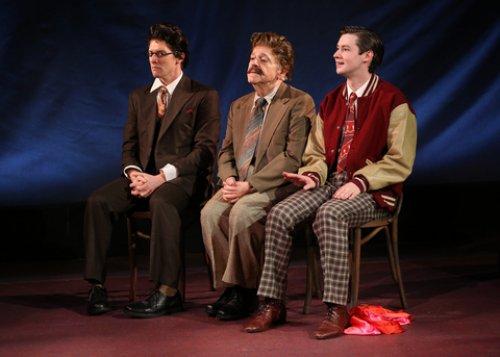
Joe Veale, Ray DeMattis and Chris Dwan in a scene from the York Theatre Company’s revival of “Enter Laughing the Musical” (Photo credit: Carol Rosegg)
[avatar user=”Victor Gluck” size=”96″ align=”left” ] Victor Gluck, Editor-in-Chief[/avatar]
For the opening production of its 50th anniversary season the York Theatre Company has revived one of its biggest hits, Enter Laughing the Musical, which it resurrected from the scrap heap a decade ago. This farcical story of Bronx teenager David Kolowitz trying to break into show business in the late 1930’s with no experience and limited talent was based on Carl Reiner’s 1958 semi-autobiographical novel about his early rise to fame.
Enter Laughing has an impeccable pedigree stretched over 60 years. In 1963 it became a hit Broadway play adapted by librettist Joseph Stein, later more famous for the book to Fiddler on the Roof, with a phenomenal cast that included veteran actors Vivian Blaine, Sylvia Sidney, Alan Mowbray and Irving Jacobson and Alan Arkin who won the Tony Award for Best Supporting Actor and became a star. It was made into a 1967 film directed by Reiner and scripted by both Stein and Reiner.
In 1976, Stein and composer-lyricist Stan Daniels, eight-time Emmy Award winner for The Mary Tyler Moore Show and Taxi, turned the play into a Broadway musical starring a miscast Robert Morse, at 45 playing the teenage David. So Long, 174th Street was a quick failure until director Stuart Ross, Stein and music director Matt Castle “added a song, cut two songs, trimmed a few scenes, added a new scene and turned a solo that was going to be cut into a show-stopping duet.” After two York Muftis and two more Mainstage productions, the rest is history.
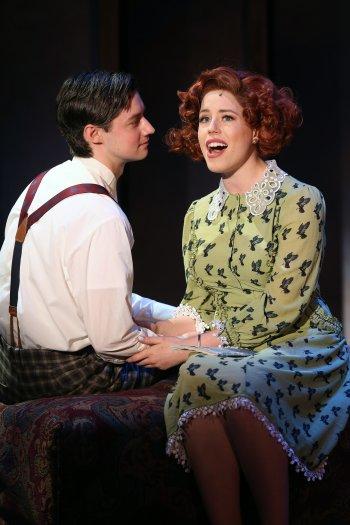
Chris Dwan and Allie Trimm in a scene from the York Theatre Company’s revival of “Enter Laughing the Musical” (Photo credit: Carol Rosegg)
This fifth production again directed by Ross has to compete with memories of the utterly hilarious 2008-9 production which included George S. Irving, Jill Eikenberry, Michael Tucker, Ray DeMattis and made a star of newcomer Josh Grisetti as young David. The current cast is not quite as accomplished as the previous York company but the show remains a winning piece of musical comedy entertainment.
It is 1938 and teenage David Kolowitz, a graduate of James Monroe High School in the Bronx, wants to be an actor but his parents insist he go to pharmacy college and become a druggist. When his friend Marvin shows him an ad for scholarships for promising young actors at the Marlowe Free Theater and School for Dramatic Arts, David decides to lie to both his boss at Foreman’s Machine Repair Shop as well as his parents and attend the audition.
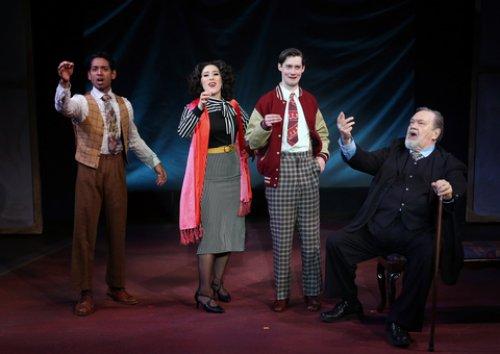
Raji Ahsan, Farah Alvin, Chris Dwan and David Schramm in a scene from the York Theatre Company’s revival of “Enter Laughing the Musical” (Photo credit: Carol Rosegg)
Without experience or much aptitude, he manages to impress Angela, the actress/daughter of impresario Harrison Marlowe, enough as “the cute one” to be offered a discount on the scholarship which means he has to pay $5 a week. He is also cast as Angela’s lover in their current play as the previous actor has quit. Among the problems he encounters is finding the money for a tuxedo for his character, making love to Angela in public, Wanda’s fears that beautiful actresses will turn his head if he becomes famous, and his parents refusing to believe his reason for coming home late from rehearsal.
How David deals with his girlfriend Wanda’s suspicions, his parents’ disapproval, his boss’ growing displeasure at his requests for time off, and Marlowe’s increasing frustration at his mistakes as a novice is the action of the musical. David’s debut onstage after three days’ study is absolutely hilarious as he makes every mistake one can make before getting the hang of it. He also finds himself balancing the needs of Wanda, Angela, his mother Emma and Miss B, the secretary on whom he has an unrequited crush.
As David, Chris Dwan does not make one forget the inimitable Grisetti who spun every moment into a comic turn. However, Dwan is charming as the undaunted hero who must deal with problems behind his ken but always comes up with a possible solution even if it doesn’t work out. David Schramm’s alcoholic and hammy Harrison Marlowe is not quite as clipped as that of the late George S. Irving whose signature role this became but his sarcasm and slow burns are still entertaining. Though Farah Alvin’s Angela Marlowe is not as affected as her predecessor as the predatory performer, she still is delicious as an actress who falls in love with all of her co-stars.
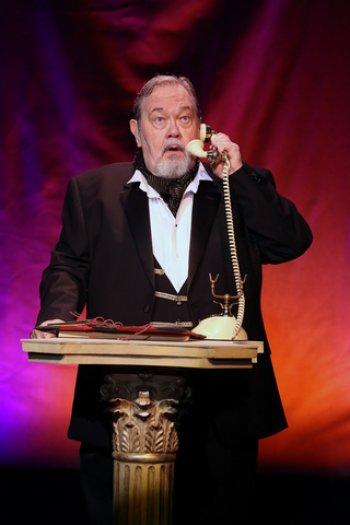
David Schramm in a scene from the York Theatre Company’s revival of “Enter Laughing the Musical” (Photo credit: Carol Rosegg)
As the Jewish mother who has her own expectations for her son’s future, Alison Fraser nails the guilt trip that doesn’t seem to have any effect on her son David. Robert Picardo as David’s father is low-key but makes his presence felt. Ray DeMattis returning to the role of Mr. Forman from the 2008-9 productions has the dry wit and quick comebacks that the role requires. Allie Trimm’s Wanda is delightful as David’s ever-suspicious girlfriend. Raji Ahsan demonstrates a dry wit as Pike, Marlowe’s stage manager. Dana Costello as Miss B., secretary at La Tesh Hats, is quite a looker. As David’s high school friend Marvin, Joe Veale is amusingly callow in the way of teenagers. Artistic director James Morgan puts in a surprise second act appearance hiding under the anagram of “Magnes Jarmo” in one of those vaudeville straight-man comedy roles.
Musically the show starts slowly with the opening number “David Kolowitz, the Actor” having a very repetitious lyric. Daniels’ score is best when it attempts its parody of 1930’s song styles and gives homage to Cole Porter, George Gershwin, Jerome Kern, among others. Of course, the best song is still the priceless fantasy “The Butler’s Song” which recounts David’s sexual exploits among the female stars of the 1930’s (all described in the program for those who are too young to remember) once he is famous and Schramm has a fine time with its tricky lyrics. Dwan and Trimm have a witty operetta parody with “It’s Like” while Dwan and Costello have a hilarious number, “You,” which strings together famous lines from love songs by Porter, Kern, Rodgers & Hart, etc.
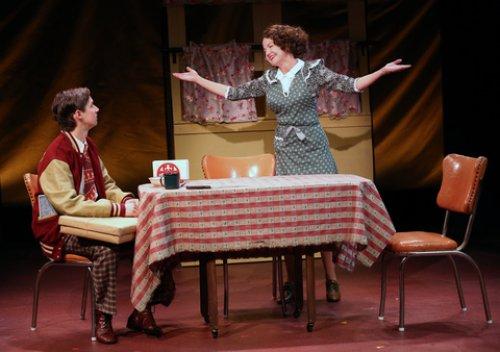
Chris Dwan and Alison Fraser in a scene from the York Theatre Company’s revival of “Enter Laughing the Musical” (Photo credit: Carol Rosegg)
Alvin has one of those delightful anti-love songs in “The Man I Can Love,” in which she ultimately reveals that she can love any man – as long as he is alive. Marlowe, Angela and Pike’s advice, “Say the Words” makes a droll number for Schramm, Alvin and Ahsan. Twice nominated for Tony Awards in musicals, Fraser delivers with ”My Son, the Druggist” and “If You Want to Break Your Mother’s Heart.” The women have a clever number, “Men,” in which Wanda gets to let out her frustrations with David. The finale, “So Long, 174th Street,” is a rousing company number in the style of George M. Cohan.
The plot devices of Enter Laughing the Musical may seem familiar now but director Stuart Ross who has directed the show in many places keeps the pace moving briskly along. His musical staging is augmented by Jennifer Paulson-Lee’s pleasing choreography. Leading the band of three, musical director Phil Reno aids the bright bouncy score. Morgan’s simple scenic design works well for this multi-scened show while his Bronx posters over the proscenium arch add to the ambiance. Tyler M. Holland’s colorful costumes are redolent of the late 1930’s era.
Enter Laughing the Musical (extended to June 23, 2019)
York Theatre Company, Theater at Saint Peter’s, 619 Lexington Avenue, at 54th Street, in Manhattan
For tickets, call 212-935-5820 or visit http://www.yorktheatre.org
Running time: two hours and 30 minutes including one intermission






Leave a comment